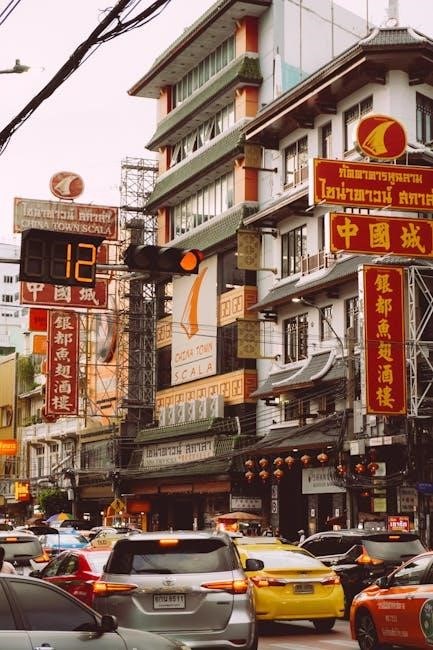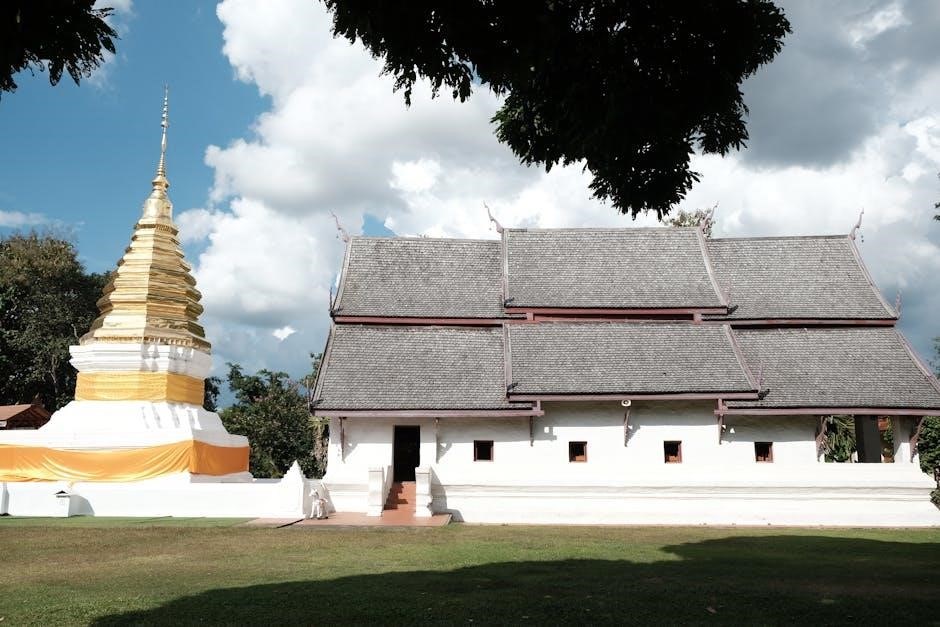
Thailand’s sex industry is a global phenomenon‚ shaped by cultural norms‚ economic realities‚ and tourism. Despite its illegality‚ it remains a significant yet controversial part of the economy and society‚ with ongoing debates about legalization and rights.
1.1 Overview of the Sex Industry in Thailand
Thailand’s sex industry is a sprawling and multifaceted sector‚ encompassing bars‚ massage parlors‚ and street-based services. It attracts both domestic and international clients‚ driven by tourism and economic demand. Despite its illegality under Thai law‚ the industry thrives due to widespread tolerance and lucrative revenue. The sector employs thousands‚ including Thai nationals and migrant workers‚ often serving as a vital income source. Efforts to decriminalize sex work aim to enhance safety‚ rights‚ and legal protections for workers‚ addressing stigma and exploitation. The industry’s resilience highlights its deep-rooted presence in Thailand’s economy and society.

1.2 Historical Context and Cultural Perspectives
Thailand’s sex industry has deep historical roots‚ influenced by cultural attitudes toward sexuality and gender. Prostitution has been documented since the 14th century‚ initially linked to royal courts and later expanding during the 19th-century modernization. Buddhist tolerance of impermanence and non-attachment contributes to societal acceptance. The Vietnam War further entrenched the industry‚ catering to foreign soldiers and establishing Thailand as a global sex tourism hub. Today‚ cultural norms often normalize the industry‚ though debates persist about its moral and legal status‚ reflecting a complex interplay of tradition and modernity.

Legal Status and Regulations
Prostitution remains illegal under Thai law‚ but the industry operates openly due to tolerate and proposed reforms. A 2023 draft bill aims to decriminalize sex work‚ sparking debate.
2.1 Current Laws Governing Prostitution in Thailand
Thailand’s current laws prohibit prostitution under the 1996 Prevention and Suppression of Prostitution Act; Despite this‚ the industry thrives due to lax enforcement and cultural acceptance. Penalties for sex workers and clients exist‚ but businesses often operate with impunity. The legal framework does not recognize sex work as a legitimate profession‚ leaving workers vulnerable to exploitation and without legal protections. Efforts to decriminalize the industry aim to address these gaps and improve safety for workers.
2.2 The Movement to Decriminalize Sex Work
A growing movement in Thailand advocates for the decriminalization of sex work to improve workers’ rights and safety. Organizations like Empower Foundation have led efforts to educate and empower sex workers‚ pushing for legal reforms. This movement seeks to reduce stigma‚ enhance protections‚ and provide better working conditions. It also aims to challenge existing laws that criminalize sex work‚ arguing that decriminalization would help combat exploitation and trafficking more effectively while recognizing the industry’s economic role.
2.3 Proposed Draft Bill to Legalize Sex Work (2023)
In March 2023‚ a draft bill was proposed to legalize sex work in Thailand‚ aiming to provide legal protections for workers and curb exploitation. The bill seeks to decriminalize the industry‚ allowing for regulation and safer working conditions. It addresses issues like underage sex trafficking and aims to institutionalize protections for workers. Despite its progressive goals‚ the bill faces opposition from conservative groups and has yet to be passed into law‚ leaving its future uncertain. If enacted‚ it could significantly alter the legal and social landscape of Thailand’s sex industry.

Sex Worker Rights and Advocacy
Organizations like Empower advocate for rights‚ safety‚ and decriminalization‚ helping workers negotiate better conditions and challenging stigma in Thailand’s sex industry.
3.1 Challenges Faced by Sex Workers in Thailand
Sex workers in Thailand face numerous challenges‚ including legal risks‚ stigma‚ and violence. Despite the industry’s visibility‚ workers often lack legal protections‚ making them vulnerable to exploitation. Many experience withheld documents‚ threats‚ and unsafe conditions. The illegal status of sex work exacerbates these issues‚ leaving workers with limited recourse against abuse. Additionally‚ cultural stigma further marginalizes them‚ making it difficult to seek help or improve their circumstances.
3.2 Organizations Fighting for Sex Workers’ Rights
Organizations like Empower have played a crucial role in advocating for sex workers’ rights in Thailand. Established in 2006‚ Empower has trained thousands of sex workers to negotiate better conditions and lobby for decriminalization. These groups aim to improve safety‚ income‚ and legal protections for workers. They also work to reduce stigma and empower sex workers to advocate for their rights. Efforts include providing education‚ legal support‚ and pushing for policy changes to recognize sex work as a legitimate profession.
3.3 Efforts to Improve Safety and Protection
Efforts to enhance safety and protection for sex workers in Thailand include advocacy by organizations like Empower‚ which provides training and support. These groups focus on improving working conditions‚ reducing violence‚ and addressing exploitation. They also work to raise awareness about rights and access to legal aid. Despite challenges‚ these initiatives aim to create a safer environment and empower workers to report abuses. Collaborations with authorities and policymakers are crucial in advancing these goals and ensuring better protection for those in the industry.

The Economic Impact of the Sex Industry
The sex industry significantly contributes to Thailand’s economy‚ generating billions annually and supporting hospitality‚ tourism‚ and related sectors‚ while providing income for countless workers and their families.
4.1 Contribution to Thailand’s Economy
4.2 Financial Transactions and Income Generation
The sex industry in Thailand generates significant revenue‚ with billions earned annually. Financial transactions occur across various sectors‚ including bars‚ massage parlors‚ and online platforms. Income is distributed among workers‚ venue owners‚ and related businesses‚ supporting livelihoods and stimulating local economies. The industry’s financial stability is crucial for many‚ especially during economic downturns. However‚ the lack of legal recognition often leads to unregulated transactions‚ posing risks for workers seeking fair compensation and safer conditions.

Safety and Exploitation Issues
The Thai sex industry faces significant safety risks‚ including violence and exploitation. Sex workers often endure unsafe conditions‚ while legal ambiguities exacerbate vulnerabilities‚ leaving many unprotected.
5.1 Risks and Violence Faced by Sex Workers
Sex workers in Thailand face significant risks‚ including physical abuse‚ sexual violence‚ and exploitation. The illegal nature of the industry leaves them vulnerable to abuse by clients‚ pimps‚ and law enforcement. Many are coerced into unsafe conditions‚ and their lack of legal protection makes it difficult to seek justice. Stigma and fear of repercussions often prevent victims from reporting crimes‚ perpetuating a cycle of violence and exploitation within the industry.
5.2 Sex Trafficking and Legal Consequences
Sex trafficking remains a severe issue in Thailand‚ with victims often forced into the sex industry. Legal consequences for traffickers include harsh penalties‚ but enforcement is challenging due to the industry’s illegal status. Organizations work to support victims and advocate for stronger protections‚ while legal reforms aim to curb trafficking by regulating the industry more effectively and ensuring justice for those exploited.

The Role of Tourism in Thailand’s Sex Industry
Tourism significantly boosts Thailand’s sex industry‚ attracting visitors worldwide. It supports bars‚ massage parlors‚ and entertainment venues‚ sustaining livelihoods for many workers in the sector annually.
6.1 Thailand as a Sex Tourism Destination
Thailand is renowned globally as a sex tourism hub‚ attracting millions annually. Major cities like Bangkok‚ Pattaya‚ and Phuket cater to diverse clientele‚ with entertainment venues‚ bars‚ and massage parlors serving as key attractions. The allure of affordable services‚ coupled with a vibrant nightlife‚ draws tourists seeking more than conventional vacation experiences. This demand fuels a multibillion-dollar industry‚ despite its legal gray areas and ethical concerns‚ making Thailand a central destination for sex tourism worldwide.
6.2 Impact of Tourism on the Sex Industry
Tourism significantly influences Thailand’s sex industry‚ driving demand and shaping its structure. Foreign visitors‚ particularly from wealthy nations‚ sustain the industry through their patronage. This influx supports thousands of workers‚ many of whom rely on tourism for income. However‚ it also exacerbates exploitation risks‚ as unregulated services thrive in tourist areas. The boom-and-bust nature of tourism impacts workers’ stability‚ highlighting the industry’s vulnerability to external factors like economic downturns and global health crises‚ such as COVID-19‚ which drastically reduced tourism and affected livelihoods.

The Pandemic’s Effect on the Sex Industry
COVID-19 restrictions severely impacted Thailand’s sex industry‚ forcing venue closures and reducing income for workers. Many lost livelihoods‚ highlighting vulnerabilities in an already precarious profession.
7.1 COVID-19 Restrictions and Their Impact
The COVID-19 pandemic led to stringent restrictions in Thailand‚ including the closure of entertainment venues and borders. These measures severely impacted the sex industry‚ with many sex workers losing their primary source of income. Bars‚ massage parlors‚ and nightclubs were forced to shut down‚ leaving thousands without livelihoods. The restrictions also disrupted the flow of tourists‚ a major clientele for the industry. This sudden economic downturn pushed many workers into financial hardship‚ exacerbating existing vulnerabilities and challenges in the sector.
7.2 Economic Hardship and Livelihood Loss
The pandemic caused significant economic hardship for Thailand’s sex workers‚ as COVID-19 restrictions shuttered bars‚ nightclubs‚ and massage parlors. Many lost their primary income source‚ struggling to meet basic needs. Migrant workers‚ particularly vulnerable‚ faced severe financial strain. With tourism plummeting‚ the industry’s revenue drastically declined‚ leaving thousands without stable livelihoods. Despite a proposed draft bill in 2023 to legalize sex work‚ the economic fallout from the pandemic continues to affect workers‚ highlighting the sector’s fragility and the urgent need for systemic support.

Future Prospects and Reforms
Thailand’s sex industry may see legal reforms‚ with a proposed draft bill aiming to decriminalize sex work. Public debate and changing attitudes could shape its future trajectory.
8.1 Potential Legal Reforms and Their Implications
A proposed draft bill aims to decriminalize sex work in Thailand‚ potentially transforming the industry’s legal landscape. If passed‚ it could enhance safety‚ reduce exploitation‚ and grant sex workers legal protections. This reform might also generate revenue through taxation and regulation. However‚ opposition from conservative groups and cultural stigma could hinder progress. The implications of legalization extend beyond the industry‚ influencing public health‚ human rights‚ and societal attitudes toward sex work in Thailand.
8.2 Public Debate and Changing Attitudes
Public debate over Thailand’s sex industry is growing‚ with shifting attitudes toward decriminalization and rights. Advocates argue that legalization could improve safety and reduce stigma‚ while opponents cite cultural and moral concerns. sex workers and activists are increasingly vocal‚ demanding recognition and protection. Media coverage and political discussions reflect a societal shift‚ though resistance remains strong. Changing attitudes are driven by human rights concerns and the need to address exploitation‚ marking a gradual evolution in how Thai society views the industry and its workers.